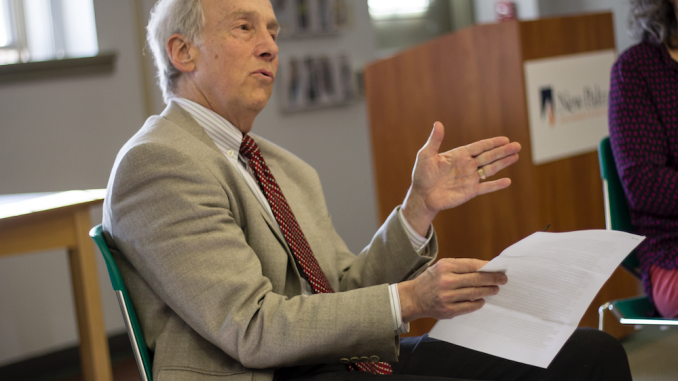
Bernard Madoff’s Ponzi scheme, fake news and the Chinese economy were the major topics in a salon-style discussion with Bob Davis, a senior editor at The Wall Street Journal.
The event, which took place on Feb. 27 and was hosted by the Ottaway Professorship, followed a Q&A with Spring ‘17 Ottaway visiting professor Rob Cox on Feb. 6.
“We often have guest speakers sponsored by the Ottaway program,” said Lisa Phillips, journalism professor and Ottaway Program committee member. “They’re a way of expanding our pool of potential professors in the future. The mission of the program is to benefit journalism classes and the program in various ways. Having guest speakers is one of them.”
Davis, who said his father had discouraged him from pursuing a career in journalism, started studying law, but dropped out. He then moved to Oneonta where he started an alternative newspaper, publishing weekly and covering politics and culture.
After the publication went out of business, and later working in print, Davis found his way to The Wall Street Journal covering economics. Much of Davis’ experience in the world of journalism came from training on the job.
“The last course I took in economics was at Bayside High School in 11th grade,” Davis said. “You can teach yourself an awful lot.”
Having initially started reporting for The Wall Street Journal on a technology beat in Boston, Davis was asked in 1990 to cover “competitiveness” in Washington, D.C. in the scope of the General Agreements on Tariffs and Trade, the predecessor to the World Trade Organization.
Competitiveness, as Davis described it, is the concept of foreign business, its impact on the United States and a “totally obscure beat.” Following his work on the General Agreements on Tariffs and trade, he began to report on the North American Free Trade Agreement (NAFTA).
Davis’ work in financial journalism, especially on NAFTA, turned his eye to international economics. One of Davis’ main interests has been China and the Chinese economy.
“I think the biggest story is in Washington [D.C.],” Davis said. “The question is, ‘what will the U.S. do in regards to China?’”
Under the Trump administration, Davis believes that competitiveness and, by association, financial journalism will once again become crucial.
Though SUNY New Paltz does not offer a course in financial journalism it is the theme of this year’s Ottaway Seminar.
“Financial journalism is a beat, it’s a specialty,” Phillips said. “Whenever we can use the Ottaway [program] for that, which we often do, we do.”
Phillips emphasized Davis’ experience with journalism and economics both before and after the start of his career. She said that his lack of experience in either field prior to working at The Wall Street Journal is one of the biggest takeaways for students who attended the discussion.
“I think that is an important perspective, someone who is in a mid-to-late stage in his career that can look at students and say, ‘be flexible, you can learn on the job and develop a focused beat,’” Phillips said.
The Ottaway Program will host a screening of “Newtown” followed by a panel discussion on March 7.
